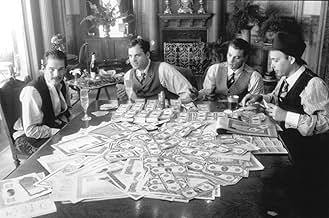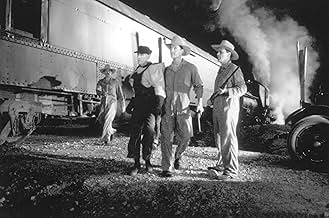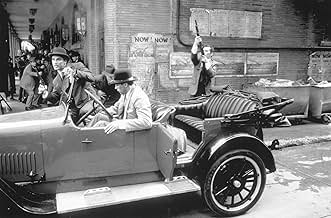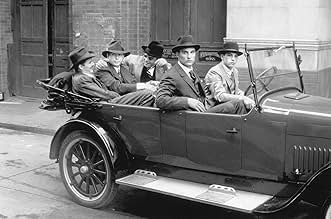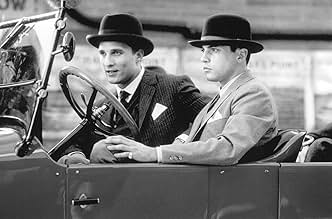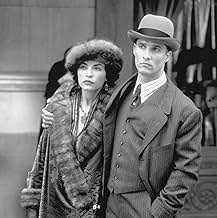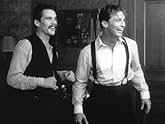AVALIAÇÃO DA IMDb
6,1/10
13 mil
SUA AVALIAÇÃO
Adicionar um enredo no seu idiomaThe story of the Newton gang, the most successful bank robbers in history, owing to their good planning and minimal violence.The story of the Newton gang, the most successful bank robbers in history, owing to their good planning and minimal violence.The story of the Newton gang, the most successful bank robbers in history, owing to their good planning and minimal violence.
- Direção
- Roteiristas
- Artistas
Avaliações em destaque
The Newton Boys were a colorful collection of brothers who robbed banks. In this bizarro world I think we're supposed to be inspired by Willis (Matthew McConaughey, Joe (Skeet Ulrich), Jess (Ethan Hawke), and Doc Newton (Vincent D'Onofrio). They managed to rob countless banks and pull off the biggest train robbery in U.S. history, all without killing anyone. Bravo... I guess.
What makes "The Newton Boys" so interesting is that it is based on a predominantly true story. Lead by Willis Newton (Matthew McConaughey, a Texan) who had big dreams of drilling for oil in the boom years after WW I, the 4 brothers used explosives to crack open safes all over the USA and Canada and robbed the banks. Willis' rationale, "We're helping to keep insurance companies in business. If there are no bank robberies then there will be no need for insurance." For reasons I don't understand at all, round safes cannot be opened like rectangular safes, so they eventually had to resort to train robbery. They were eventually caught, tried, and convicted. After serving a little time (max. 5 years) most of them retired to Uvalde, Texas, a small town west of San Antonio and in the "texas Hill Country" so popular with motorcyclists. Most of them lived long lives and died in Uvalde.
Julianna Margolies was excellent as Willis' love interest. They eveidently stayed together into old age, even though they never married.
Pretty good film.
Julianna Margolies was excellent as Willis' love interest. They eveidently stayed together into old age, even though they never married.
Pretty good film.
I watched this on DVD because it was recommended by Jonathan Rosenbaum on his ten-best list for the year, and the cast interested me, especially D'Onofrio and Skeet Ulrich. This confirms my admiration of the under-seen Ulrich, who's the doubting, conscience-stricken brother. His uneasiness stands out against the tedious good-old-boy jollity of the others. That shtick is a little too easy to do, and I don't think it gets the Twenties quite right, really. Rosenbaum is a great film critic but his end of the year recommendations are not always to be trusted, which makes you wonder about how written-in-stone his 1000 films list is. He also said that since the expansive images were a big part of the pleasure of the movie he didn't know how good it would be on DVD.
Gosh, was it really so easy to rob a bank in those days? The way some of the robberies go makes it look like it was all a cinch, but surely they'd be scared sometimes because you still stood to go to jail for it, maybe for a good long time. Actually it was easy to robe banks with square-doored safes, and it isn't so hard to hold up a little bank today.
This is surprising from Linklater not only because of the step into genre, but because of his willingness to glorify and simplify his good-boy/bad-boy crew. Where are the tormented and confused guys of his stoner movies? Matthew McConaughey certainly does rise to the challenge with a spirited and enthusiastic performance, but all his moments are still clichés. Hawke similarly grins and giggles in a quite shallow way. His character is not well defined and D'Onofiro, arguably the best actor of the bunch, is wasted. Statistically the Newton bank robbers were remarkable, but Ebert may be right that they are less famous than Dillinger or Bonnie and Clyde because they were too "respectable," i.e., dull. The screenplay lacks an angle, other than the glib one of boys on a lark, which fails to convince, and even when things go wrong, lacks a tragic dimension.
The action is desultory, lacking a strong focus on character or action or any guiding principle. Hence comparison with 'Bonnie and Clyde,' or more dashing adventures in the same vein like 'Butch Cassidy and the Sundance Kid' or 'The Sting,' simply isn't really possible. This isn't in the same league. It utterly pales in comparison to European robbery films like 'Rififi' or the recent 'Mesrine' gangster epic starring Vincent Cassel. Only the few moments with Dwight Yoakam as Brentwood Glasscock, the brothers' explosives expert, provide a welcome 'Rififi'-like hint of bank-robbing as a challenging activity requiring certain skills and techniques.
This is not to say you can't have fun watching. These young actors are in their physical prime, and that includes the ladies, notably the handsome-looking Julianna Margulies as McConaughey's girlfriend. The period flavor is sometimes ripe and tasty. The production is very good-looking, and there is some nice cinematography: a silhouetted image of the mail train the Newton brothers are about to rob is particularly cool. The whole cadre things are set in, including the jaunty music, is conventional, but it's undeniably fun. The movie's a little long, but the climactic later scenes are involving. But still, this is very far from Linklater at his best, and Rosenbaum ought to admit he erred in ranking it so high.
Gosh, was it really so easy to rob a bank in those days? The way some of the robberies go makes it look like it was all a cinch, but surely they'd be scared sometimes because you still stood to go to jail for it, maybe for a good long time. Actually it was easy to robe banks with square-doored safes, and it isn't so hard to hold up a little bank today.
This is surprising from Linklater not only because of the step into genre, but because of his willingness to glorify and simplify his good-boy/bad-boy crew. Where are the tormented and confused guys of his stoner movies? Matthew McConaughey certainly does rise to the challenge with a spirited and enthusiastic performance, but all his moments are still clichés. Hawke similarly grins and giggles in a quite shallow way. His character is not well defined and D'Onofiro, arguably the best actor of the bunch, is wasted. Statistically the Newton bank robbers were remarkable, but Ebert may be right that they are less famous than Dillinger or Bonnie and Clyde because they were too "respectable," i.e., dull. The screenplay lacks an angle, other than the glib one of boys on a lark, which fails to convince, and even when things go wrong, lacks a tragic dimension.
The action is desultory, lacking a strong focus on character or action or any guiding principle. Hence comparison with 'Bonnie and Clyde,' or more dashing adventures in the same vein like 'Butch Cassidy and the Sundance Kid' or 'The Sting,' simply isn't really possible. This isn't in the same league. It utterly pales in comparison to European robbery films like 'Rififi' or the recent 'Mesrine' gangster epic starring Vincent Cassel. Only the few moments with Dwight Yoakam as Brentwood Glasscock, the brothers' explosives expert, provide a welcome 'Rififi'-like hint of bank-robbing as a challenging activity requiring certain skills and techniques.
This is not to say you can't have fun watching. These young actors are in their physical prime, and that includes the ladies, notably the handsome-looking Julianna Margulies as McConaughey's girlfriend. The period flavor is sometimes ripe and tasty. The production is very good-looking, and there is some nice cinematography: a silhouetted image of the mail train the Newton brothers are about to rob is particularly cool. The whole cadre things are set in, including the jaunty music, is conventional, but it's undeniably fun. The movie's a little long, but the climactic later scenes are involving. But still, this is very far from Linklater at his best, and Rosenbaum ought to admit he erred in ranking it so high.
Though not on par with some of his more noted works such as Dazed and Confused or Before Sunrise, The Newton Boys is still a noteworthy film by Richard Linklater, focusing on the all-to-real story of the four Newton brothers from Ulvade, Texas who ended up robbing over eighty banks and a train in just four years before finally being arrested and imprisoned in 1924.
What Linklater does here that is most interesting is his use of music and detached style of shooting. Nearly all of the music on the soundtrack consists of blues-infused, upbeat country style which is consistent with the setting of this movie but not necessarily the tone. There is a dark underlying element to this story, most notably in the evolution of the main character Willis, played so wonderfully and engagingly by Matthew McConaughey it makes one shake their head as to why he would continue to make useless romantic comedies these days. Willis begins the film as bright, optimistic, a loyal son and brother but upset about the way justice is mistreated in south Texas. Determined to right this wrong, he becomes enamored with the idea of robbing banks, justifying it by claiming that the banks are the real thieves and his form of stealing would simply be a little thief taking from a big one.
Though many of the subsequent scenes are nothing original in this genre, simply derivative of Bonnie and Clyde or Butch Cassidy and the Sundance Kid, the four leads are all very engaging and likable, especially McConaughey and Ethan Hawke. Linklater keeps the audience at a distance with the use of the awkward music and the lack of character depth. In many cases, the supporting cast is simply that rather than an opportunity to reflect the brothers' view of their lives and worldview. Nevertheless, the film is as a whole better than the most recent of its kind. It has an innocent-like quality to it thanks to the fervent belief of Willis Newtown: doing this was simply a way to make money and for that reason there was no reason for them to stop.
What Linklater does here that is most interesting is his use of music and detached style of shooting. Nearly all of the music on the soundtrack consists of blues-infused, upbeat country style which is consistent with the setting of this movie but not necessarily the tone. There is a dark underlying element to this story, most notably in the evolution of the main character Willis, played so wonderfully and engagingly by Matthew McConaughey it makes one shake their head as to why he would continue to make useless romantic comedies these days. Willis begins the film as bright, optimistic, a loyal son and brother but upset about the way justice is mistreated in south Texas. Determined to right this wrong, he becomes enamored with the idea of robbing banks, justifying it by claiming that the banks are the real thieves and his form of stealing would simply be a little thief taking from a big one.
Though many of the subsequent scenes are nothing original in this genre, simply derivative of Bonnie and Clyde or Butch Cassidy and the Sundance Kid, the four leads are all very engaging and likable, especially McConaughey and Ethan Hawke. Linklater keeps the audience at a distance with the use of the awkward music and the lack of character depth. In many cases, the supporting cast is simply that rather than an opportunity to reflect the brothers' view of their lives and worldview. Nevertheless, the film is as a whole better than the most recent of its kind. It has an innocent-like quality to it thanks to the fervent belief of Willis Newtown: doing this was simply a way to make money and for that reason there was no reason for them to stop.
In a way, it seems like a waste to gather Matthew McConaughey, Ethan Hawke, Skeet Ulrich, and Vincent D'Onofrio for this movie, because they should've been able to do something great, although, if it weren't for them, it would have been boring. It is a straightforward assembly of the facts of the incredible run of 80 bank robberies by the Newton brothers. Then they go for the big one, a train robbery of Federal Reserve funds. It is entertaining, but I was most entertained during the running of the credits. Over to the left, they show clips of Joe Newton at about age 79, on Johnny Carson's Tonight Show, interspersed with film clips of an interview with Willis Newton in his 80's, both giving their views of what it was like and how they felt about what they had done. After seeing Hollywood's version of their lives, it was interesting to see what they were like in old age.
Você sabia?
- CuriosidadesMatthew McConaughey is from Uvalde, Texas, as was the real Willis Newton, the character he plays in the movie.
- Erros de gravaçãoAfter the armoured car robbery, when the boys stop the car and fight about why it had gone so badly, a modern day wheelchair-access drop-down curb is seen. During the 20s, no such curb would have existed. They would have been straight across.
- Citações
Willis Newton: This isn't a real job.
Jess Newton: It is real. It is real fun.
- Cenas durante ou pós-créditosAs the end credits roll, portions of two interviews are shown, each with one of the brothers. The interview with Joe Newton is from James Coco/Joe Newton/Chet Atkins (1980); the interview with Willis Newton is from The Newton Boys: Portrait of an Outlaw Gang (1976).
- Trilhas sonorasThe Pearls
Written by Ferdinand 'Jelly Roll' Morton (as Ferdinand Joseph 'Jellyroll' Morton)
Performed by The Jim Cullum Jazz Band
Produced by Bob Erdos
Courtesy of Stomp Off Records, York, PA
Principais escolhas
Faça login para avaliar e ver a lista de recomendações personalizadas
- How long is The Newton Boys?Fornecido pela Alexa
Detalhes
- Data de lançamento
- País de origem
- Idioma
- Também conhecido como
- The Newton Boys
- Locações de filme
- San Antonio, Texas, EUA(Toronto Canada Clearinghouse. Chicago Train Station, exterior. Omaha City Street. Toronto neighborhood. Toronto Hotel, interiors. Toronto City Scenes. Omaha Hotel, Omaha, Nebraska. A&TC RR Yard, Railcar interiors)
- Empresas de produção
- Consulte mais créditos da empresa na IMDbPro
Bilheteria
- Orçamento
- US$ 27.000.000 (estimativa)
- Faturamento bruto nos EUA e Canadá
- US$ 10.452.012
- Fim de semana de estreia nos EUA e Canadá
- US$ 4.010.245
- 29 de mar. de 1998
- Faturamento bruto mundial
- US$ 10.452.012
- Tempo de duração
- 2 h 2 min(122 min)
- Cor
- Mixagem de som
- Proporção
- 2.39 : 1
Contribua para esta página
Sugerir uma alteração ou adicionar conteúdo ausente


